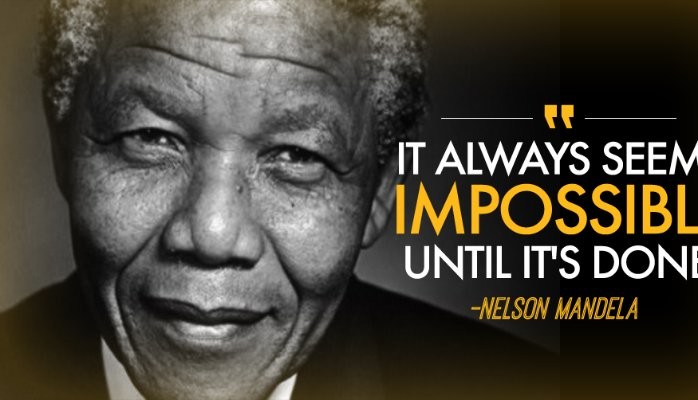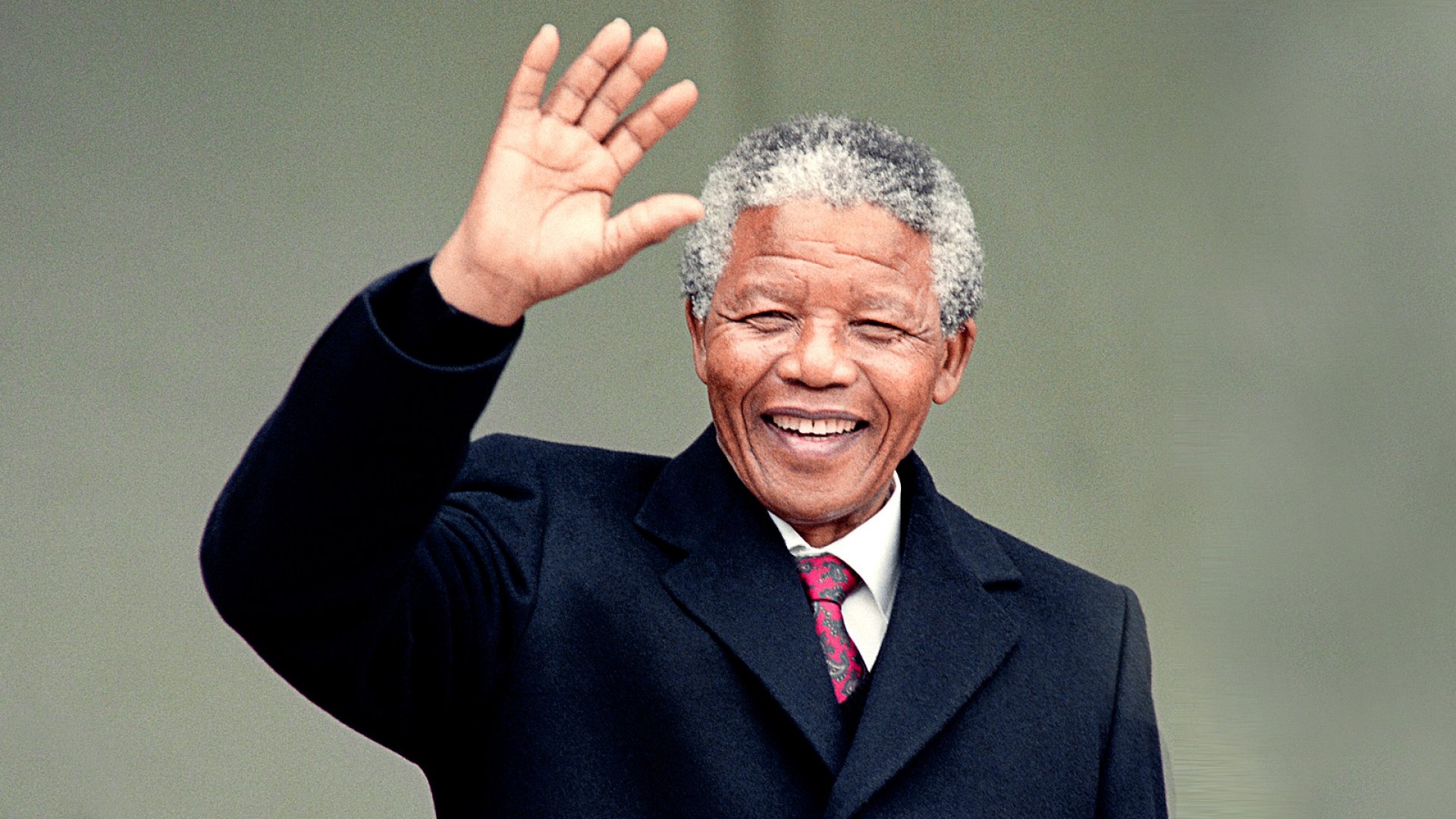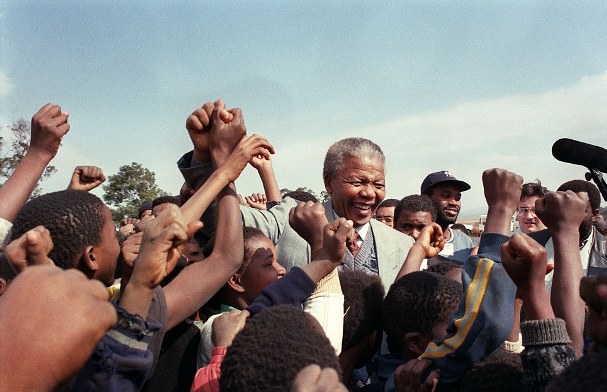Nelson Mandela,
one of the most iconic figures in modern history, is a living testament to the belief that with determination, courage, and vision, the impossible can indeed be achieved. His journey from a small village in South Africa to becoming the country’s first Black president is a powerful narrative of resilience, hope, and perseverance. Mandela’s life teaches us that the impossible is only a barrier until it is confronted with unyielding will and unwavering commitment.
Early Life and the Seeds of Change
Mandela was born on July 18, 1918, in the rural village of Mvezo, South Africa. He grew up in a society deeply divided by race, where the white minority government enforced apartheid—a system of institutionalized racial segregation and discrimination. Despite these oppressive circumstances, Mandela’s early experiences instilled in him a sense of justice and equality.
As a young man, Mandela pursued education, studying law at the University of Witwatersrand. His exposure to diverse ideas and his observations of systemic injustice fueled his desire to fight for a fair and equitable society. Even at this stage, Mandela displayed the traits of perseverance and optimism that would define his legacy.
The Fight Against Apartheid:
Mandela joined the African National Congress (ANC) in 1944, committing himself to the struggle against apartheid. The ANC’s goal was to dismantle the system of racial oppression and create a democratic South Africa. Initially advocating for peaceful protests, Mandela organized campaigns and rallies to raise awareness about the injustices of apartheid.
However, as the apartheid regime grew more brutal, Mandela and his comrades recognized that nonviolent resistance alone might not suffice. This realization led to the formation of Umkhonto we Sizwe ("Spear of the Nation"), the armed wing of the ANC. Mandela became its leader, orchestrating acts of sabotage against government infrastructure to weaken the apartheid system.
This shift to armed resistance highlighted a critical lesson from Mandela’s life: sometimes, making the impossible possible requires adaptability and boldness. His decision was not made lightly but reflected his understanding of the complexities of the struggle for justice.
The Price of Freedom: 27 Years in Prison:
In 1962, Mandela was arrested and later sentenced to life imprisonment for his role in resisting apartheid. For 27 years, he was confined to prison, primarily on Robben Island. This period was marked by isolation, hard labor, and attempts by the government to break his spirit. Yet, Mandela refused to succumb to despair.
-
Optimism in Isolation
One of Mandela’s most remarkable qualities was his ability to maintain hope even in the darkest times. He spent his years in prison studying, reflecting, and preparing himself for the day he would be free. Mandela believed that every obstacle could be turned into an opportunity for growth. -
Building Bridges
While in prison, Mandela began secret talks with the apartheid government, signaling his willingness to seek a peaceful resolution to South Africa’s racial conflicts. This act demonstrated his vision for reconciliation and his belief that even the most entrenched divisions could be healed through dialogue and understanding.
Mandela’s time in prison teaches us that perseverance is not just about enduring hardship—it’s about using adversity as a platform for transformation.

Freedom and Leadership: Turning the Impossible into Reality:
In 1990, after widespread international pressure and decades of activism, Mandela was released from prison. His freedom marked a turning point in South Africa’s history. However, the challenges ahead were immense. The country was on the brink of civil war, with deep-seated racial tensions threatening to tear it apart.
-
Promoting Reconciliation
Mandela’s greatest achievement was his ability to unite a divided nation. Rather than seeking revenge for the injustices of apartheid, he advocated for forgiveness and reconciliation. As South Africa’s first Black president (1994–1999), Mandela prioritized nation-building over division, working tirelessly to heal the wounds of the past. -
Creating the Truth and Reconciliation Commission
Mandela supported the establishment of the Truth and Reconciliation Commission (TRC), a body tasked with uncovering the atrocities committed during apartheid. By encouraging truth-telling and accountability, Mandela ensured that the nation could confront its painful history while fostering healing and forgiveness.
This period of Mandela’s life underscores the power of vision and moral leadership. His ability to forgive those who had wronged him personally and politically was a testament to his belief in the greater good.
Mandela’s Legacy: Lessons for Making the Impossible Possible:
Mandela’s life offers timeless lessons for anyone seeking to overcome challenges and achieve what seems impossible.
-
Resilience in the Face of Adversity
Mandela’s 27 years in prison could have broken his spirit, but he emerged stronger and more determined. His resilience shows that no matter how daunting the circumstances, perseverance can pave the way to success. -
The Power of Hope
Mandela’s unwavering belief in the possibility of a better future inspired millions. He understood that hope is a powerful motivator that can sustain individuals and movements during difficult times. -
Adaptability and Strategic Thinking
Mandela’s willingness to shift from peaceful protests to armed resistance, and later to negotiate with his adversaries, demonstrates the importance of adaptability. He was not rigid in his methods but remained steadfast in his goals. -
Forgiveness as a Tool for Change
By choosing reconciliation over revenge, Mandela demonstrated the transformative power of forgiveness. His ability to see beyond personal grievances to prioritize national healing is a lesson in selflessness and vision. -
Building Bridges
Mandela understood that lasting change requires collaboration, even with those who were once adversaries. His efforts to engage with the apartheid government exemplify the importance of dialogue and mutual understanding.
Applying Mandela’s Lessons in Daily Life
Mandela’s life may seem extraordinary, but his principles are applicable to everyday challenges:
- Set Bold Goals: Like Mandela, believe in your capacity to achieve what others deem impossible. Break your goals into manageable steps and stay committed to your vision.
- Embrace Resilience: When faced with setbacks, remember Mandela’s example. Use adversity as an opportunity to grow stronger and wiser.
- Practice Forgiveness: Holding onto anger can be a barrier to progress. Choose to let go of grudges and focus on building positive relationships.
- Stay Hopeful: Even in tough times, cultivate optimism. Visualize the outcome you want and work consistently toward it.
- Engage in Dialogue: Whether in personal relationships or professional settings, prioritize communication and understanding over conflict.

Mandela’s Enduring Impact:
Nelson Mandela’s life continues to inspire people around the world. His story is a reminder that the most daunting challenges can be overcome with determination, courage, and vision. Mandela not only dismantled apartheid but also laid the foundation for a more just and equitable South Africa.
His ability to turn the impossible into reality was not rooted in superhuman abilities but in qualities that we all possess: perseverance, hope, and a commitment to justice. By embodying these traits, we too can confront our challenges and achieve extraordinary outcomes.
Conclusion.
Nelson Mandela’s life is a profound example of how one individual can defy odds and change the course of history. His journey from a rural village to a global icon of peace and justice proves that the impossible is only a temporary barrier. Through resilience, hope, and vision, Mandela transformed not only his own life but also the lives of millions.
As we reflect on his legacy, let us take inspiration from his courage and determination. Let Mandela’s story remind us that no matter how insurmountable a challenge may seem, with the right mindset and effort, we can make the impossible possible.


You must be logged in to post a comment.